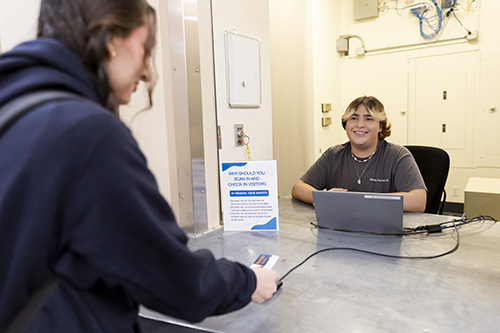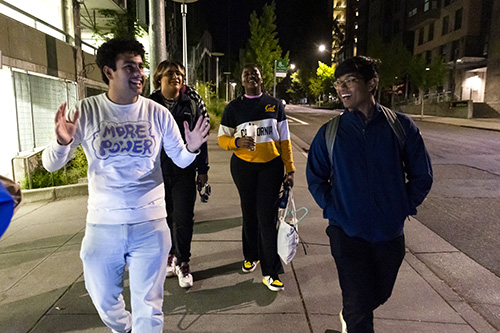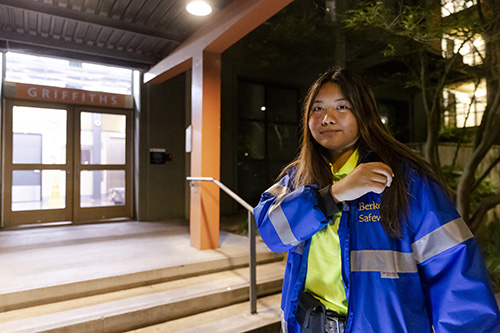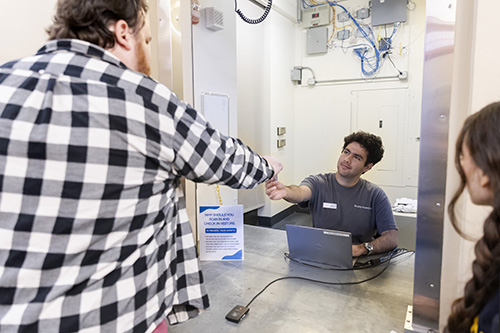The safety and wellbeing of our residents is of paramount importance to us. We know each and every one of you is also invested in your personal safety and those of your fellow students. It takes all of us working together to promote safety throughout our community. Residential Life takes safety seriously and has dedicated student staff and professional staff to help ensure your safety.
Residential Life Safety Program
Residential Life oversees the Residential Life Safety Program (RLSP), and provides instruction and help with student concerns.
The residence halls have on-site student staff who have received safety and security training and enforce the standards developed to help keep everyone safe.
Safety Ambassadors

Safety Ambassadors:
- are student employees stationed at nighttime at the entry areas of specific housing complexes to verify identification of residents and their visitors
- receive specialized safety and security training
- are supervised by Safety Coordinators in their housing complex
- are a resource for anyone that feels they are in an unsafe situation
- can be found after 9 p.m. at specific housing complexes, including the entrances of Anchor House, Units 1, 2 and 3 (including Beverly Cleary), Martinez Commons, and Blackwell Hall.
Protect Your Home: Always Tap in

- Always tap in with your own Cal 1 Card or fob when entering your building. If your building uses keys, have your key in hand. Tapping in or showing your key is the equivalent to using your house key to unlock your front door at home.
- Even though it may feel like the natural or polite thing to do, please avoid holding the door open for people to enter behind you.
- Even when someone holds the door open for you, please tap in. It reaffirms that you live here and can help reduce anxiety for your neighbors about potentially letting in a stranger.
- Sign in guests at the Safety Ambassador booth, if your building has one.
Guests
Checking in guests is part of resident/community safety and helps to ensure that everyone in the building is a resident or a welcome guest of one.
- Guests and residents will need an ID to be able to enter. (A digital Cal1 Card is acceptable.)
- The RA on duty or Safety Ambassador will need to collect the resident’s name and room number and the name of the guest.
- Checking in a guest can take a couple of minutes. Having your ID ready will help speed it along.
- If any guest feels uncomfortable providing an ID or their name, that is their prerogative, but they won’t be able to enter.
- Refusal to comply with the requirements, or ignoring the Safety Ambassador’s instructions, is a violation of your housing agreement and will be addressed accordingly.
Safety Tips for Residents

When living in a city and shared community, it’s important to always remain aware of your surroundings:
- DO always tap in with your own Cal 1 Card or fob when entering your building. If someone holds the door open for you, please still tap in to reaffirm safe practices.
- DO report potential suspicious activity to your RA on duty, the Safety Ambassador, or your unit’s front desk. (You also can report potential suspicious activity or concerns to the UCPD non-emergency number: 510-642-6760. )
- DO NOT hold the door open.
- DO NOT allow anyone to “tailgate” (follow behind or with you) when you enter a secure building.
- DO consider using SafeWalk for a free walking escort to your destination. Take a moment to program your phone now: 510-642-9255 (642-WALK).
- DO remain aware of your surroundings at all times. If you look distracted, for instance by checking your phone a lot or by listening to something loud on your earphones, you may be seen as an easier target.
Community Service Officers (CSOs)

If you live in the Clark Kerr, Foothill or Stern residence halls, which do not have central check-in desks, Community Service Officers (CSOs) conduct nighttime patrols near your residence hall. CSOs are students who are trained and employed by the UC Berkeley Police Department to provide a high-profile uniformed presence during nighttime hours. CSOs also provide the SafeWalk night safety escort service.
How You Can Become a Safety Ambassador

Any undergraduate can apply for a Safety Ambassador position (not just residence hall residents):
- Hourly paid position, minimum wage. (Work-study is encouraged but not required.)
- Typical hours: 9 p.m. to 1 a.m., Sunday through Thursday, 9 p.m. to 1:45 a.m. Friday through Saturday; shifts are flexible
- Maximum hours: 19 per week (4 shifts a week)
- The program provides growth opportunities
- No special skills needed, full training provided
Job Responsibilities & Training
- Safety Ambassadors will sit at the entrance after the Front Desk closes to make sure each person taps in to get in the door, and then tap again to confirm they are a resident. (Guests are signed in by the resident.)
- You also will be trained on mental health awareness; how to help with anyone experiencing conflict outside of RAs; alcohol awareness; stop the bleed/first-aid training; and more.
To learn more and apply, please visit the Safety Ambassador Job page.